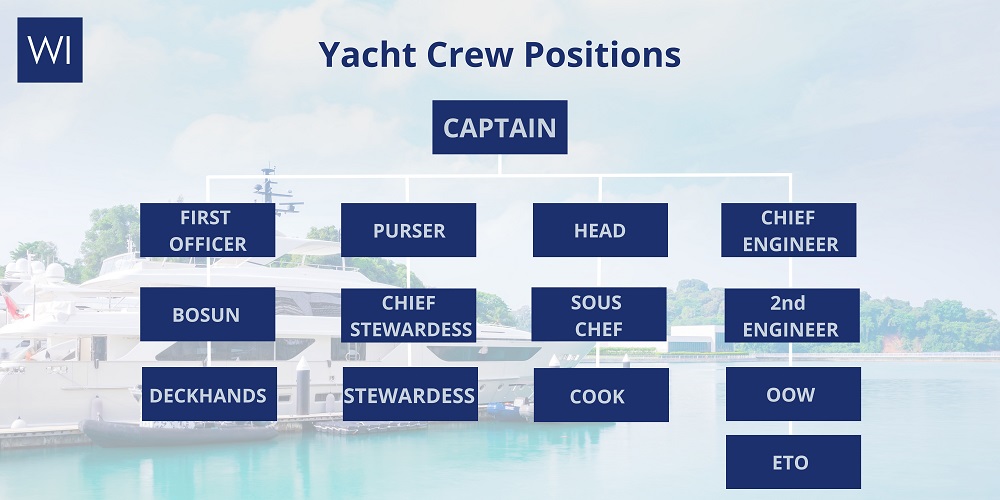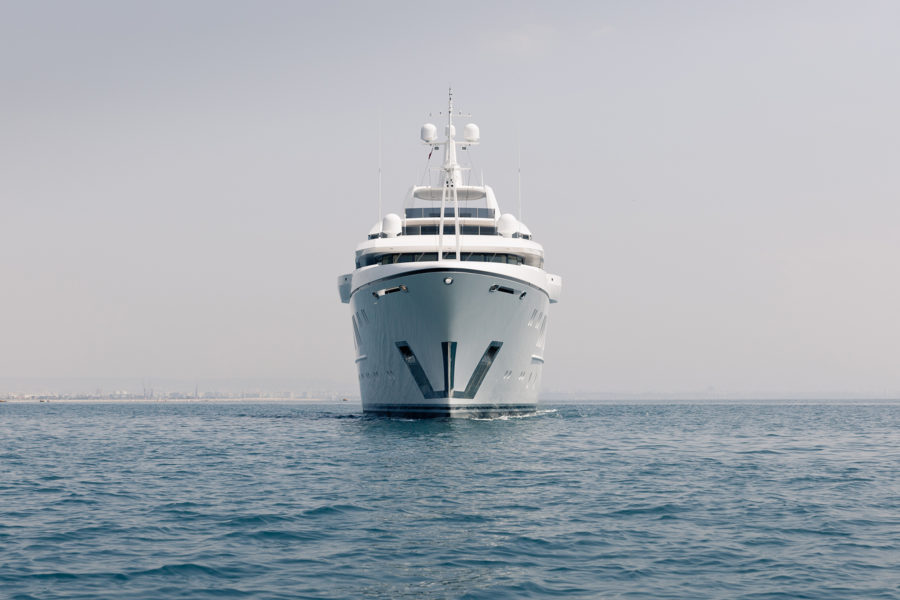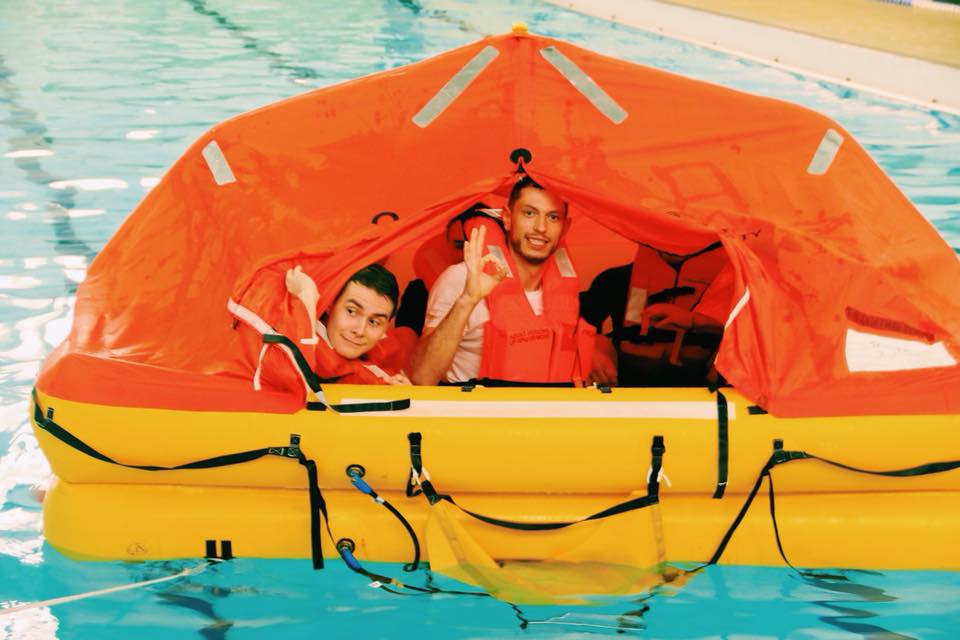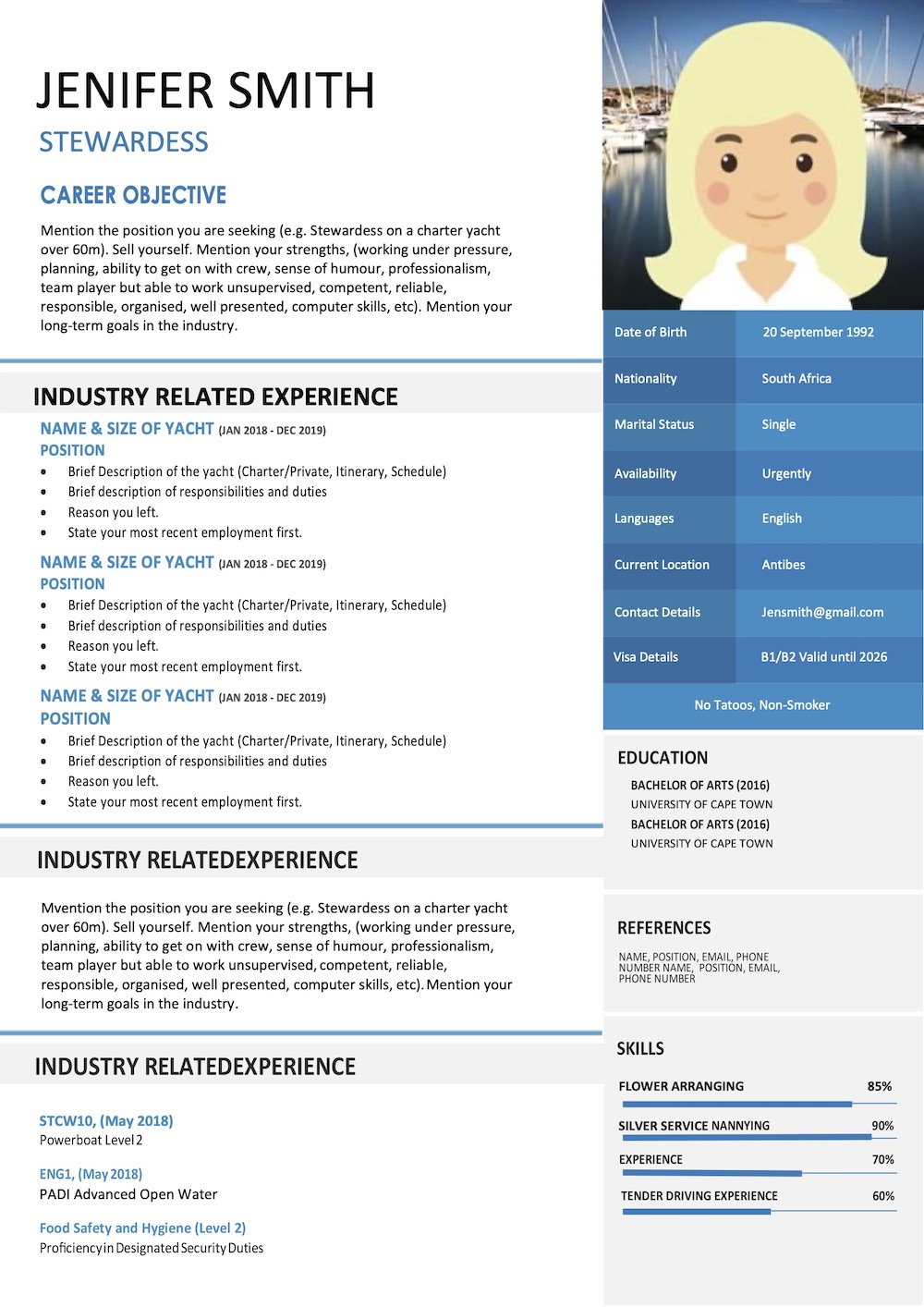- Yachting for beginners
- Owning a yacht
- Motor Yachts
- Sailing Yacht
- Indian Ocean
- Mediterranean
- Buying or Selling a Yacht
- Yachting Events
- FAQ – Luxury Yacht Charter
- FAQ – Buying a Yacht
- FAQ – Sell your Yacht
- How Much Does It Cost To Charter A Luxury Yacht?
- All our Blog Post & News


Yacht crew positions : Hierarchy, Missions & Salaries explained

Like any well-run hotel, restaurant, or other luxury service, a crewed yacht needs organized structure and good management. Whether you’re staffing your own luxury vessel or looking for an exciting career working and traveling the world, you need to know how this structure works, and what you can expect to pay or earn and do in the various roles on board.
Every yacht is a little different, and organization may reflect the style of the captain or the demands of the owner. But the same jobs need to be done on almost every boat. Organized with ranks, heads of each division report to the Captain. It’s not a military-style organization, but there are parallels with merchant marine grades and structures.
Smaller yachts need fewer crew, and staff may wear multiple hats that cross more traditional divisions and may combine some jobs with others. Large yachts have more distinct divisions or subdivisions, with more specialization to divide tasks and manage staffing. The core skills are the same, but finding staff with the right blends to do the jobs is key. Crew with broader skills are highly sought after.
As a yacht owner, you shouldn’t have to worry about day-to-day management decisions or organizing all this. That’s why you have a captain, and it’s better to leave staffing decisions entirely up to him or her. But it’s still important to know what it is people you’re hiring do, why they’re there, and how many you need. You don’t want too many crew, or to be short-handed. An understanding of what your yacht needs helps you talk to the captain to keep your yacht running how you want it.
For those looking to break into yacht crew work, consider your skills and strengths, and what jobs appeal to you. You’ll need training before you work, and you can direct your job path through the training you seek. Your goal is a suitable position on a well-run yacht, so make yourself the most attractive candidate possible.
Yacht Work Life

Working on a yacht is also living on the yacht. Crew must have a space to sleep, food, and all the basics that any employee needs. Large yachts have space reserved for crew, and owners looking for quality crew should provide good working and living conditions. Your crew takes care of you, and you should take care of them.
Depending on where a yacht operates or what flag she flies, a variety of labor laws or rules may be in effect. These requirements may be for work visas, contracts and written agreements, and compliance with merchant and ship crew treaties and laws. Be prepared to have work and non-disclosure agreements between yacht and crew, though a few yachts skip this.
Seasonal Jobs
Many yacht positions are seasonal. Year-round employment is more likely for senior crew like the captain and department heads, but not all yachts see year-round use. And some yachts may use different crew in different locales between seasonal moves.
Any job listing should give seasonal information, with geographic information, the length of the season, and the prospects for year-round positions and repeat employment.
Hours, Salaries, and Expectations
Yacht crew is a service job at its core, and every yacht owner is looking for service-oriented people who understand how to deliver a hotel-quality living and restaurant-quality fine dining. Work experience in luxury hotels and restaurants is a big plus for some jobs, and makes breaking into yacht work easier.
Yacht work can be very demanding, with periods of intense work when the owner and guests or a charter party is on board. Long days aren’t uncommon, but often balance with slack time when the boat is empty of passengers. There is always work to be done, but there’s usually a chance for time off.
Most salaries are monthly, since many positions are seasonal. Pay ranges are commensurate with experience, rank, and responsibility. Private vessels usually offer higher base pay, as charter crew can earn tips on top of their base salary. Because of the demands of the lifestyle, compensation is good and you have minimal living expenses on board.
Benefits and Time Off
Because so many jobs are seasonal and may occur in different countries and locations, benefits offered to yacht crew vary widely. But it is not uncommon for crew to be offered health and accident insurance and a flight to the vessel. Living on board, you’ll get food, rooming (usually shared), basic toiletries, uniforms, and laundry. Yachts with a longer view may offer additional training to long-term prospects.
Time off is usually linked to boat use, and may be sporadic in-season or when the boat has the owner and guests on board. There will always be some time off, but it may be between very intense work periods.
Most crew jobs have an employment contract that meets the Maritime Labour Convention 2006 (MLC). This should spell out the contract period and duration, as well as salary, leave and time off, probationary periods, repatriation policies, and any other crucial details to meet the minimum international standards of crew welfare.
This contract should also contain shipboard policies on confidentiality and non-disclosures, drug and alcohol use on board, personal hygiene expectations, interpersonal relationships, and dispute resolution. Job expectations and requirements can also be included, with specific language about roles, tasks, and cooperation between divisions.
Note that all crew agreements will explicitly prohibit drug use on board, most limit alcohol consumption and ban hard liquor on board, and many boats have policies prohibiting intimate personal crew relationships. Because the crew is living on board full time and in close quarters, rules to maintain decorum and crew harmony may be in writing.
Training & Certificates
Two key certifications are required for yacht crew. Employers look for the STCW (Standards of Training, Certification and Watch-keeping for Seafarers) and the ENG1 (Seafarer Medical Certificate). Insurers generally require crew to have these two certifications or the equivalent.
The ENG1 isn’t a class. It’s a medical exam to ensure that the crew is physically fit to serve at sea and has no underlying conditions that may arise far from help. It’s best for prospective crew to secure the ENG1 before investing more time and money training.
STCW is a week-long class on the basics of onboard safety. This includes hands-on modules covering personal survival, fire safety, first aid and CPR, accident prevention, and security awareness. It needs to be refreshed every five years.
Shared, Hybrid, and Crossover Jobs
Larger vessels will have more defined duties and specific areas of responsibility. But smaller yachts may want the crew to have different roles in different situations. For example, a hybrid job description may read “3rd Engineer/Steward” and describe a role in engineering when the boat is empty but on inside crew when passengers are on board.
When hiring or seeking jobs be prepared to look for creative crossover skill sets to meet the needs of the vessel.
Extra Skills and Duties
Any extra skills outside the regular duties makes crew more attractive. From stewards who can teach yoga, give massages or play cocktail piano to deck crew who know how to water ski, SCUBA dive, or fish, anything that crew can bring to enhance the passenger experience adds value to the employee.
If you’re looking for a position, list the skills you’d be comfortable using. If a vessel owner is looking for something specific, spell it out and figure out how that special duty fits into the employee work day.
The Four Main Divisions

Most yacht crews break into four primary divisions which group related tasks and responsibilities together. While the grouping sounds like it’s by section of the boat, they’re really more functional. For example, stewards (Interior) will definitely serve meals, whether they’re in the main dining room or out on deck. Deckhands (deck) are going to be involved in painting, sanding, and varnish jobs anywhere on the boat.
The deck crew handles most of the exterior operations of the yacht, and runs it. Deck hands and crew keep the boat looking clean and shiny, and handling most vessel operations. This includes driving and operating the yacht, navigation, running all launches and ship’s craft, handling lines, and all maintenance and painting, washing, and shining.
2-Interior (or Inside)
Inside crew are primarily the stewards and housekeepers. Larger vessels will have a dedicated housekeeping staff separate from the stewards, but smaller vessels may not.
Stewards keep the interior clean, do all housekeeping, laundry, food and beverage service, cabin preparation, and anything else needed for the comfort of the passengers.
3-Engineering
Below decks, the engineering department ensures the safe and smooth running of all the ship’s machinery and electronics. Engineers are engine and systems specialists, and there will usually be a dedicated electronics expert. Most engineer jobs require professional training and certification.
Fine dining is a hallmark of the yachting experience, and a full-time galley crew prepares all meals for passengers and crew. The head chef plans the menus and provisions the boat, while junior chefs assist the head chef with meal preparation and keeping the galley spotless.
Yacht Job and Department Details

Departments are all organized in a hierarchy, with a department head reporting to the Captain. The clear chain of command makes for smooth operations, with all communications going up and down ranks. Junior staff will occasionally take instructions from other divisions as all crew is expected to help as needed. A captain or department head may organize staff differently, so reporting structures listed are guidelines only.
All salary ranges are monthly figures and are ranges based on yacht size and crew experience. Senior jobs on larger yachts have more responsibility than the same job title on yachts with smaller crews. Experienced crew are very desirable and can expect more pay for their positions.
Listed responsibilities are not exhaustive, and different yachts may allocate some jobs to different positions.
Read also: The yacht charter experience ladder
The Captain

The captain of the vessel is the overall decision maker for the yacht in all situations, including the safety of the vessel. The owner should leave the Captain responsible for operational decisions about hiring and staff and operating the ship. To become a captain requires years of experience and training, and a broad set of skills including yacht operations, personnel management, budgeting and finance. The captain works directly with the owner and owner’s representative, if the captain is not also acting as the representative.
On an organization chart, the Captain is usually placed in the deck division, but the Captain is always the senior-most crew on the yacht and all division heads report to the Captain.
Responsibilities include:
- Responsible for all navigation and running the yacht.
- Senior decision maker on all crew hiring.
- Manage repairs, refits, and yard work.
- Manage budgets and accounting. On larger yachts, this task ends more on the Purser, but the captain is always responsible.
- Ensure all paperwork, clearances, and legal requirements are completed.
- Primary contact with the owner or charter parties.
Reports to: The yacht owner
Salary Range: $6,000 to $22,000
The deckhands handle all the outside responsibilities of the ship, including cleaning and maintenance of the yacht and all the ship’s vessels and toys on board. Deck crew will have significant contact with passengers in this role, operating launches and delivering guests to and from shore and handling the toys.
All deck crew have watch responsibilities on passage, and daily responsibilities keeping the yacht pristine and clean. They will also do line handling and secure the yacht.
Deck department : Chief Mate/First Officer
The Chief Mate or First Officer is the second in command of the vessel, and left in charge when the Captain is not on board. The first mate has the requisite skills to stand in for the captain and run the yacht if needed and usually acts as the division head of the deck team.
The seamanship skills needed are similar to the Captain’s position.
- Primary safety officer for the yacht and all passengers and crew.
- Supervise and manage all operations on deck.
- Bridge watches on passage.
- Passage planning and navigation.
There may be additional mates on larger vessels, these 2nd, 3rd, etc. mates have similar responsibilities on rotation. But the first mate is senior and always second in command.
Reports to: Captain
Salary Range: $4,000 to $9,500 (First mate)
Second and more junior mates may earn $2,000 to $4,000
Deck department : Bosun

The Bosun is the senior deckhand and manages the junior hands on board. This will usually be the most experienced hand on board.
- Organizing all operations on deck.
- Coordinating the use, storing and launching of the ship’s boats, toys, and equipment.
- Managing the passerelle, watching passenger safety.
- Contact point for guest service on boats, toys, and trips to shore.
Reports to: First mate
Salary Range: $3,000 to $5,000
Deck department : Deckhands

Deckhands are constantly busy with maintenance, cleaning, polishing, and assisting guests as needed. They will assist other departments as needed or given special duties.
- Daily cleaning of the yacht’s exterior.
- Painting, varnishing, polishing.
- Line handling.
- Launching and operating dinghies and tenders.
- Repairs and carpentry.
- Helping guests as needed – everything from handling baggage and gear to embarking and disembarking.
Reports to: Bosun
Salary range: $1,300 to $3,000
Though every position on a yacht is service-oriented, the interior or inside crew provides the primary customer service. They will interact the most with the passengers daily, and they’re directly responsible for the quality of their experience on board.
Interior department : the Purser

The purser is the chief financial officer of the yacht and handles all the financial operations on board. Accounting, purchasing, payroll and hiring, and all money matters end up with the Purser. This is a senior staff position, and may be the interior department head. Smaller yachts may eliminate the purser’s job and add it to the captain’s and other senior staff duties.
Responsibilities Include:
- Accounting and bookkeeping for all financial transactions.
- Human resources and payroll.
- Handling logistics for all departments related to purchasing.
- Managing contracts.
- Event coordination, including off yacht bookings and payments.
- Primary administration of the boat’s business paperwork.
- Inventory and supply management.
Salary Range: $4,000 to $8,000
Interior department : The Chief Steward/ess

The chief steward or stewardess has primary responsibility for all service roles inside. Food and drink service, cabin preparation, and anything to do with helping the passengers be more comfortable and enjoy their stay. The chief steward will be inside crew with several years of experience.
The chief steward manages the interior staff, setting and enforcing vessel service standards. The chief steward ensures the crew delivers a five-star hospitality experience.
Chief Steward Responsibilities:
- Scheduling and training junior crew for meal and drink service and cabin preparation.
- Primary contact with guests for meals and drinks.
- Sommelier and wine service.
- Coordinate with the galley for meals and presentation.
- Decorate the interior, from flower arrangement to table settings.
- Arrange onshore activities and outings.
Reports to: Captain or Purser, depending on the yacht
Salary Range: $4,000 to $8,500
Stewards/Stewardesses
The stewards and stewardesses are the primary guest service staff. They will work closely with guests and passengers, and have daily contact with them as they meet most of their needs while on board.
Steward Responsibilities:
- Food and drink service.
- Room preparation and turndown service.
- Cleaning, polishing, housekeeping, and inside maintenance.
- Cabin detailing.
- Laundry, pressing, and folding.
- Help with outings, trips, debarkations.
Reports to: Chief Steward
Salary Range: $1,500 to $4,500
Housekeeping

Larger yachts may have a dedicated housekeeping and laundry staff. This will be part of the inside crew, under either the purser or the head steward. There may be a senior housekeeper, if there are more than one housekeeping crew on board.
Responsibilities are the cleaning and laundry portions of the steward’s job, and a laundry steward may spend most of her time inside the ship’s laundry.
An experienced Head of Housekeeping may earn from $4,500 to $7,000, while a Laundry Steward typically earns from $2,500 to $3,500.
Read also: CAN OWNING A YACHT TO CHARTER (REALLY) BE PROFITABLE?
Food service requirements on any yacht are high. Whether it’s a privately owned vessel or a charter, the expectations are always for top tier food service, with a variety of meals planned for the requirements of every passenger. Chefs and cooks prepare all meals on board for passengers and crew, but sometimes other interior crew may help with prep work or cleanup.
Smaller yachts have smaller galley crews, but the largest vessels may have an executive chef and several sous chefs. All chef positions require formal culinary training and experience, but cook positions are often entry level. Promotion from cook to chef is unusual without additional training.
Galley department : the Head / Executive Chef

On larger yachts, an Executive Chef will run the entire galley with the help of sous chefs and cooks. With an Executive Chef, there’s an expectation that the food and menus will be on a level with Michelin star-rated restaurants.
The executive chef brings a thorough understanding of food preparation and presentation, and moves food preparation past creative up to artistic. Job responsibilities are similar to a chef, but the job demands and the required experience and education are much higher.
Salary range: $7,000 to $11,000

The chef has overall responsibility for all meals on the yacht, from provisioning in remote places to hygiene and good safety. If there’s only one chef, she’s the head of the galley crew. Finding the best provisions in far away locations and making the best of local food availability is a major part of the job.
- Planning a delicious and varied menu for passengers.
- Sourcing all food and arranging transport to the yacht.
- Maintaining and operating within the galley budget.
- Preparing passenger meals with professional presentation and style.
- Cleaning and maintaining galley and galley equipment.
- Deliver menus and meals on time, while running an organized and spotless galley.
Galley department : Sous Chef
The sous chefs assist the chef in all aspects of running the galley, and may have independent assignments to plan and guest and crew meals. While not primarily responsible for provisioning, the sous chef will help with food selection, menu preparation, and planning. A sous chef must have formal culinary training.
Reports to: Head chef
Salary Range: $3,500 – $6,000.

Galley department : The Cook
Cooks may be entry-level positions or experienced, but do not require formal gastronomy education. They will assist the chef and sous chefs, cooking meals and dishes for guests and crew, helping with provisioning, and keeping the galley neat.
- Assist with provisioning and buying high-quality food from local sources.
- Follow all food handling and safety guidelines.
- Assist the head chef as needed, taking direction and guidance.
- Prepare guest and crew meals as required.
- Staying on top of galley inventories and supplies.
Salary Range: $2,500 to $3,500
Engineering

The engineering department keeps the yacht and all its systems working. Whether it’s the engines, electronics, air conditioning, or the plumbing – it’s up to engineering to keep it running.
There is considerable overlap with commercial shipping in the engineering field, as many of the same skills apply. And there is a broader range of qualifications and grades based on the size and power of the vessel. Job ratings may be set by required experience based on tonnage of ship or power of engines, with corresponding levels of pay and responsibility.
Unlike commercial shipping, engineers may get involved in other aspects of running the yacht, like helping with docking and water sports with mechanical toys.
Engineering certifications, training, ratings, experience and licensing are critical to hiring competent engineers, and for engineering crew it’s an important facet of career advancement. This is important for Chief and 2nd Engineers, which are often broken out by MCA (U.K. Maritime and Coastguard Agency) rating or other international equivalent.
MCA ratings for engineers Commercial and Private Yachts over 24m are:
Y4: Less than 200 Gross Tons and less than 1,500 kW engine power Y3: Less than 500 GT and 3,000 kW Y2: Less than 3,000 GT and 3,000 kW Y1: Less than 3,000 GT and 9,000 kW
There is also an unlimited rating for merchant vessels larger than the Y1 category. For discussing salary and responsibilities, we will include all ratings in one position description, but pay scales with the size of the yacht and any required higher ratings.
Chief Engineer
The chief engineer manages all aspects of keeping the yacht and its systems running. The chief engineer manages all the engineering staff, and directs all maintenance, repairs, troubleshooting and upgrades. This is a management position, but requires extensive hands-on technical experience and knowledge. Chief engineers on large yachts hold an MCA Y1 or Y2, smaller boats will have a lower rated chief and a smaller staff. Check Jooble.org to find abroad marine engineer vacancies.
- Provisioning, shopping, and stocking.
- Preparing passenger and crew meals.
- Following instructions and cooking under the direction of others.
- Galley cleaning.
- Follow food safety and storage procedures.
- Food pre-preparation.
Salary Range: $6,000 to $15,000
2nd Engineer
The second engineer is also a highly skilled position requiring a rating or license and several years of experience. This senior level engineer also needs knowledge of how to troubleshoot and maintain all yacht systems.
- Maintain and manage all engineering operations.
- Hire, train and supervise all engineers.
- Project manage all upgrades and retrofits, including managing budgets, contracts, and suppliers.
- Coordinate maintenance schedule for the entire yacht around the usage and seasonal schedules.
- Maintain costs and accounting for engineering operations.
- Design and handle all safety operations.
- Set and maintain standards for operations and cleanliness in the engine room.
Reports to: Chief engineer
Salary Range: $5,500 – $10,000
OOW (Officer of the Watch) Engineer
The OOW is a junior engineering position, but still licensed. There are two categories of OOW – MEOL (Marine Engine Operator License) and the more junior AEC (Assistant Engine Course). The overall responsibilities are similar, working to support the senior engineers and handle independent assignments. The AEC rating is entry level for licensed crew, but has training and certification.
- Support the chief in all projects.
- Maintain a clean, safe engine room.
- Perform all maintenance, troubleshooting and repair tasks as needed.
- Support motorized water sports.
- Occasionally assist with other vessel operations, like line handling.
Reports to: Chief Engineer
Salary Range, MEOL: $4,500 to $6,000 Salary Range, AEC: $2,500 to $3,500
Electronics/Technology Officer (ETO)
The ETO takes responsibility for all audio-visual and information technology on board. Ensuring passengers have access to the internet, movies, television, and music is a primary responsibility. This position carries a fair amount of passenger interaction, and an ETO needs good troubleshooting skills to go with customer service skills.
- Ensure all audio/visual and entertainment systems are always available for passengers.
- Assist passengers with personal technology and ship systems as needed.
- Conduct regular maintenance and upgrades of the network, information, and A/V systems around passenger schedules.
- Assist other engineers as needed, especially with electronic systems.
- Contribute as needed with other departments for boat and passenger operations.
Salary Range: $4,000 to $9,000
Junior Engineer
This is a lower or entry level position for someone with engineering skills but without formal licensing or certification. The junior engineer will help with safety and cleanliness, and assist in any engineering tasks as needed. The ability to solve problems and fix things opens this spot for anyone capable and willing to do the job.
- Help with cleaning, maintenance, and safety functions.
- Help anywhere needed on the yacht.
- Assist senior engineers as needed, taking direction and following instructions exactly.
- Constantly develop skills.
Read also: IS BUYING A BOAT A BAD IDEA?
Whether you are a yacht owner or considering entering this dynamic industry with an established and reliable crew, it is essential to have an understanding of the yacht’s hierarchical structure, mission priorities, and salary expectations. By doing your research on the complexity of yachting before hiring your team, you can confidently select the right group of experienced and qualified professionals for your needs. Staying up-to-date on top industry trends and knowing the capabilities of each type of yacht crew position will enable you to make sound decisions that support a safe and cost-effective journey. With quality personnel at your helm, you can cruise unhindered in luxury and explore new destinations with peace of mind.
Fractional Yacht Ownership : Everything you Need to Know
What is the best country to register your yacht offshore, you might also like.

What differentiates a yacht from a superyacht or a mega yacht?

Chartering Requirements and Regulations: A Guide for Boat Owners

What are the Fastest Cruising Catamaran on the Market?
Personalised Job Feed
Housekeeping stew, deck/ steward(ess), chief engineer, 2nd officer, 3rd officer, masseuse/ stew, crew chef/ cook, sole engineer, service stew, 2nd engineer, chief officer, deck/ engineer, head of housekeeping, lead deckhand.
No jobs matching your preferences. Do you want to be among the first to hear about jobs like these? Get alerts for new jobs.
Job Announcements for Yachts, Boats & Marinas

Brokerage, Charters and Marketing

Engineers, Technicians and Electricians

Port, Commercial Vessels, Towing Boats

Detailers And Repairers

Cruise Boats and Ships
Find your dream job in the marine industry, latest yacht and marine job opportunities:.

Suntex Marinas Marine Mechanic
200 ton captain needed.

Sea Ray/BIMC - Maintenance Technician
Palm beach based captain needed, exterior worker, housekeeper with service skills, experienced deck/stew.

Ultimate Boating Safety Guide 2024: Essential Tips & Legal Advice for Safe On The Water
Discover the ultimate Boating Safety Guide for 2024, packed with essential tips, legal advice, and practical checklists to ensure safe and enjoyable sailing. From pre-departure preparation to navigating emergencies, this guide is a must-read for every boater. Click to learn how to make your boating experience safer and more compliant with the law.

Insights from a Professional Chief / Sole Stewardess - Alyson Kehler
Dive into our exclusive interview with Alyson Kehler, a seasoned Chief/Sole Stewardess, as she shares her journey and expert insights into the luxurious world of yachting. Discover the challenges, rewards, and the vibrant lifestyle of a professional yacht stewardess.

How to Hire Yacht Crew: Your Guide to Finding the Best Team for Your Yacht
Looking to hire yacht crew? Find experienced captains, deckhands, engineers, and more with WorkOnYacht.com. Our guide provides you with simple steps to recruit the best team for your luxury vessel. Get started today and elevate your boating experience
Why Post Jobs With Us?
- Targeted Promotion: We consistently promote our platform on top resources like Google Search, Facebook, and Instagram, ensuring your job postings reach the right audience.
- Automated Job Posting: As soon as you post a job on our platform, it is automatically shared on Facebook and Twitter, ensuring immediate and wide-reaching visibility.
- Dashboard Management: Manage all your job postings easily from one place with our user-friendly dashboard.
- Email Subscribers: Our growing list of subscribers receive daily email notifications about new jobs, increasing the visibility of your postings.
- Google Jobs Integration: Jobs posted on our platform are automatically distributed to Google Jobs, expanding their reach.
- Security and Support: Our platform is secure and provides customer support.
- Efficiency: We are straight to the point. Our platform is a real tool designed to connect employers with the right candidates efficiently and effectively.
Why Engage With Us?
- Extensive Job Opportunities: Discover a comprehensive array of positions within the marine and yachting industry, ranging from dockhands to captains, mechanics, and forklift operators.
- Visibility Through Detailed Profiles: Create a detailed profile that will be visible on our platform, allowing companies and yacht owners to find and hire you directly.
- Regular Updates: Stay informed with consistent updates, including new job postings and insightful blog articles.
- User-Friendly Interface: Navigate our platform with ease, guided by our detailed step-by-step instructions.
- Access to a Wealth of Opportunities: Gain access to a broad spectrum of job opportunities within the yachting industry.
- Stay Informed: Subscribe to our platform and receive the latest job updates directly to your inbox.
- Join a Professional Community: Become a part of our dedicated community, focused entirely on the yachting industry.
Are You Hiring?
Hire The Best Marine Professionals on WorkOnYacht.com
Session Expired

Working On A Yacht? 9 Things To Consider + Salary Examples
Working on a yacht gives you the ability to spend your days and nights at sea while exploring fun and far-off places.
For this reason, many people wonder how to get into the industry and what other things they need to know about working on a yacht.
In this post, we’ll talk about the top 8 things to consider before getting a job on a yacht.
We’ll also talk about how much yacht workers earn:
Table of Contents
Are You Qualified To Work On A Yacht?

According to BlueWaterYachting, there are about 15,000 yachts in the world that are large enough to require a professional yacht crew.
This might sound like a lot, but not when you compare it to the number of people that would like to work on a yacht.
To set yourself apart from these people, you’ll want to have experience in whatever position you’re looking to fill.
Wondering what types of jobs exist on a yacht?
6 popular jobs you might hope to get on a yacht:
There are also other yacht-specific jobs that might come up as well. For instance, I saw a yacht that had two professional massage therapists on board.
These people might not be needed on every yacht like a captain would be, but they were needed for this particular yacht.
In addition to general job specifics, you’ll also need to be trained to work on a boat.
Many different companies offer short courses that will teach you the basics of yachting as well as the basics of first aid and water rescues.
You Need People Skills
Another thought to consider is that you’ll need to have superior people skills when working on a yacht. Remember, you’ll be in close quarters with a small group of people day in and day out. If you’re angry at a coworker or customer, you won’t have the ability to go home to get away from them at the end of the day.
For this reason, it is important that you’re able to get along well with others.
Also, remember that a yacht crew is often very diverse. People on your crew might come from different countries where the cultures are quite different.
You’ll need to be able to learn these people’s social customs and you’ll need to be comfortable with the fact that they might still be learning about yours.
Getting to know new people and new cultures is very rewarding but it can be difficult at first. You’ll need to be willing to work much harder at it on a boat than you would at a typical 9 – 5.
What About Sea Sickness?
Are you prone to motion sickness? If so, working on a yacht might not be the best idea. Getting sick on a short cruise might not be a big deal. The cruise is over in a few hours and shortly after you arrive on land, the seasickness goes away.
However, if you’re sick on an ocean voyage, you might be sick for days or even weeks at a time.
Before signing on to work on a yacht, you might want to take an ocean voyage to see how your body will react. It would be sad to get signed on to a three-month job only to find that after a few weeks you’re just too sick to continue.
Is there anything that can be done to stop seasickness?
Luckily, many people have found that their tolerance goes up over time. However, some people never get used to the sea and they will always be sick while traveling on it.
These people might want to change industries or find a more stable boat that does not go out in rough waters. For example, a person that gets seasick on the ocean might be perfectly fine working on a party boat on a river.
How About Your Health?
Another thought to consider is the fact that being at sea limits your ability to get medical care and medicine. People with long-term diseases might want to think twice before working on a yacht.
Imagine you have to take daily medication to stay healthy. Now imagine that this medicine does not show up at your next port. Will the yacht owner stick around to get you your medicine?
What happens if you don’t get your medicine? Will the disease become irreversibly worse?
People with health issues may want to resolve these issues before they look into a career on a yacht.
Otherwise, they might want to work on a yacht that does not do long trips. If your yacht only does weekend trips, you could always store extra medication on the boat to ensure your safety.
Privacy Issues To Consider
Privacy can certainly be at a premium on a yacht. Crew quarters are almost always shared quarters and you may not even have your own bed.
I’ve seen some ships where two people on different shifts share the same bunk.
For some people, this isn’t a big deal, for others, it could be a nightmare.
Also, remember that you’ll always be in close contact with other people. If you’re an extrovert the yacht could seem like paradise. However, if you’re more introverted and need to have a significant amount of alone time to be happy, this might not be the job for you.
Getting any real time to yourself on a yacht can often be an impossibility.
In fact, even extroverts may want to bring a set of earplugs with them so that they can get some peace and quiet from time-to-time.
How About Your Friends and Family
Setting sail across the ocean on a yacht while getting paid to do so can be a dream for some people. In fact, it might be a dream of yours. But, have you thought about your family and friends.
When you’re off on a 12-month voyage, you won’t be able to see your friends and family.
Depending on your situation, you might have to miss people’s weddings, graduations, birthdays, and many other momentous occasions. You may also find that when you get back, some of your personal relationships just aren’t as close as they used to be.
In fact, some of your friends may even resent you for leaving.
On the other hand, it is easier than ever to stay in touch with friends and family member while staying out of reach. With emails, satellite phones, and video calls, you can continue to cultivate relationships from afar, you just might have to work harder at it.
Seasonality For Working On Yachts
Jobs on yachts are often seasonal and can often be unsteady.
Some larger charter yachts might have a crew throughout the entire year.
The company that owns these yachts will want the crew ready to set sail for any customers they might get. In this case, the crew may only have passengers a few months out of the year.
Other jobs on yachts might only last a season. In fact, the most in-demand yacht jobs are usually only three months. This can be great for students and teachers looking to fill their summer up with a fun and interesting job.
For others, this kind of work might not be steady enough.
Availability
A potential yacht worker might also want to consider their availability. Jobs are more likely to appear around June and end in September. If you’re not available during these months, you may find that jobs are harder to acquire.
You’ll also need to be very flexible when it comes to availability.
These jobs can come up quickly and they can be filled quickly as well.
When a yacht owner wants to set sail it can often be at a moment’s notice so you won’t have much time to think about whether or not you want to take the job.
Wait a few days to respond and the yacht may have set sail by the time you answer.
What’s The Salary For Yacht Captains + Crew Members?
The salary of a yacht worker will vary, mostly based on the job title and job responsibilities.
Here are some example salaries of jobs that you might do on a yacht:
- Yacht Captain Yacht captains often receive large salaries. This salary is typically based on the size of the yacht that they are working on. According to CNN, this job is a six-figure job that can often range from $100,000.00 to $250,000.00. The reason this job pays so well is that it can be a stressful job. Captains need to be available 24 hours a day. They also have to be skilled in both managing people and operating large ships.
- Yacht Engineer/Deckhand These crew members will often average around $48,000.00 a year or $4,000.00 a month.
- Steward/Stewardess This crew member will average between $30,000.00 and $45,000.00, depending on experience. More experienced stews will often manage the other stews so they’ll end up earning more money for doing so.
- Yacht Chef The yacht’s chef usually makes six figures as well. This is because the chef is expected to be an experienced chef that can make luxury meals while out at sea.
Here’s everything you need to know about exactly how much the yacht captain and crew make .
They actually also make quite a decent amount of money from tips given by the owner’s guests .
Final Thoughts
Working on a yacht can be a fun and lucrative experience.
Just know that there are some challenges and be prepared to meet them when the time comes.
Click to share...

Is Working On A Yacht Worth It? Here’s What You Should Know

Have you ever dreamed of working on a yacht, and sailing the world’s most beautiful seas? It may sound like a glamorous job, but is it really worth it? Working on a yacht is a unique experience, and it can be incredibly rewarding for those who are ready for the challenges and opportunities that come with the job.
In this article, we’ll explore what it takes to be a yacht crew member and discuss the benefits, qualifications, challenges, and risks that come with the job.
We’ll also dive into the cultural and financial rewards that come with working on a yacht.
So if you’re looking for a job that will take you around the world, read on to find out all you need to know about working on a yacht.
Table of Contents
Short Answer
Working on a yacht can be a great experience for many people.
It can provide a unique opportunity to travel, learn new skills, and meet people from all over the world.
However, it can also be hard work, with long hours and the possibility of seasickness.
Whether or not it is worth it depends on the individual and their goals.
What Are the Benefits of Working on a Yacht?
The benefits of working on a yacht are numerous and varied.
For starters, there is the chance to explore some of the worlds most beautiful locations, and to live and work in a unique environment, often surrounded by breathtaking scenery.
Working on a yacht can offer an escape from the daily grind, with flexible hours and the opportunity to meet new people and experience different cultures.
Additionally, there is the potential to earn a good salary, as many yacht jobs come with a generous pay package.
For those looking to explore the world while gaining valuable job experience, working on a yacht can provide an ideal opportunity.
Not only will you be able to travel to some of the most exotic and remote locations, but you will also be able to learn valuable skills such as navigation, maintenance, and hospitality.
Working on a yacht can also offer the chance to build a strong network of contacts, as you will be in contact with other crew members and travelers from all over the world.
Finally, the lifestyle associated with working on a yacht can be incredibly rewarding.
You will be able to meet interesting people, explore different cultures, and gain a unique insight into how the world works.
You will also be able to enjoy the simple pleasures of life, such as swimming, sunbathing, and spending time with friends and family.
What Sort of Qualifications or Experiences Are Needed to Work on a Yacht?

Working on a yacht is a unique and exciting experience, but it’s important to understand the qualifications and experiences needed to land one of these jobs.
Most positions require at least a minimum of boating experience, either through the military or through a recreational certification.
Those looking to work in the galley or as a steward may need culinary or hospitality training.
Those interested in engineering positions should have a degree in engineering or a related field.
There are also positions available for those with medical training, such as nurses and paramedics.
In addition to the necessary qualifications, having a valid passport and the ability to travel are essential for working on a yacht.
Most jobs require that you be able to leave at a moment’s notice and stay away for extended periods of time.
You should also be comfortable living in small spaces and working in close quarters with other crew members.
Communication, teamwork, and problem-solving skills are also important for a successful career on a yacht.
Finally, having the right attitude is an important factor in securing work on a yacht.
Employers are looking for crew members who are friendly and outgoing, as well as those who are willing to take initiative and take on responsibility.
They also want someone who is eager to learn and can adapt to the ever-changing environment of the sea.
Having a positive attitude and an open mind is essential for success in this field.
What Are the Challenges of Working on a Yacht?
Working on a yacht might sound like a glamorous opportunity, but there are some challenges as well.
From long hours to physical labor to living in confined spaces, there are some drawbacks that potential crew members need to consider.
One of the biggest challenges of working on a yacht is the long hours.
Many positions require crew members to work long shifts, with some jobs requiring up to 12-hour days.
In addition, crew members often have to be on call at all times, meaning their sleep can be disrupted if theres an emergency.
Physical labor is another challenge of working on a yacht.
From stocking shelves and cleaning cabins to running lines and fixing equipment, crew members often have to do a variety of manual labor tasks.
This can be difficult for some people, especially those who are not used to physical labor.
Living on a yacht can also be challenging.
Yachts are often cramped and uncomfortable, with limited space to move around.
This can be difficult for those used to having their own space.
In addition, crew members have to adjust to living in close quarters with others and may have to share a cabin or bunk.
Finally, being away from home can be a challenge.
Working on a yacht means being away from family and friends for long periods of time.
This can be difficult for some, as it can lead to feelings of loneliness and homesickness.
Ultimately, working on a yacht can be a rewarding experience, but its important to consider the challenges that come with it.
From long hours and physical labor to cramped living quarters and being away from home, there are some drawbacks that potential crew members need to be aware of.
What Are the Opportunities for Professional Development?

Working on a yacht can be a great opportunity for professional development.
Those who take on a job on board a yacht can expect to gain valuable skills and experience that they can use in their future career.
For instance, working on a yacht requires individuals to have excellent customer service skills, as they will be interacting with guests and crew members on a daily basis.
Additionally, those who work on a yacht can learn valuable navigation and navigation-related skills, as well as the ability to work with a wide variety of electronic and mechanical equipment.
Working on a yacht also requires individuals to be able to think on their feet and solve problems quickly, which is a valuable skill for any career.
Finally, working on a yacht provides individuals with the opportunity to develop their interpersonal skills, as they will be working in close proximity with other crew members.
Therefore, working on a yacht can provide individuals with the chance to hone their existing skills and learn new ones that can help them in their future career.
What Are the Potential Risks?
When considering working on a yacht, people should also be aware of the potential risks and costs associated with it.
While there can be great rewards, there can also be significant risks.
For example, the weather can be unpredictable and dangerous, and the boat may encounter mechanical problems or run aground.
The costs of maintenance, repairs, and supplies can be high, and there is a risk of job insecurity due to the nature of the industry.
Additionally, living aboard a yacht for extended periods can be uncomfortable and physically demanding.
People should weigh the potential risks carefully before deciding if working on a yacht is worth it for them.
What Are the Financial Benefits of Working on a Yacht?

When it comes to considering the financial benefits of working on a yacht, the first question that usually comes to mind is: How much money can I make? The answer to this question depends on the type of job you are looking for, as well as the size, age, and location of the yacht you are working on.
Generally speaking, working on a yacht can be a lucrative opportunity.
Many yacht crew members are paid a generous salary, along with other benefits such as food, lodging, and medical insurance.
Depending on the job, you may also receive bonuses and other perks such as travel allowances, clothing allowances, and even a share of the profits.
In addition to a salary, many yacht crew members also receive tips from the guests they serve.
Tips can range from a few hundred dollars to several thousand, depending on the type of trip and the size of the yacht.
Tips can add up quickly and can be a great way to supplement your income.
Finally, many yacht crew members are eligible for a variety of tax deductions, including costs associated with maintaining the boat.
This can include expenses such as fuel, repairs, and supplies.
By taking advantage of these deductions, you can significantly reduce your tax burden, making working on a yacht even more profitable.
Ultimately, the financial benefits of working on a yacht depend on the type of job you are looking for and the size, age, and location of the yacht you are working on.
With the right job and the right yacht, working on a yacht can be an incredibly rewarding and profitable experience.
What Are the Cultural Benefits of Working on a Yacht?
Working on a yacht can provide a unique cultural experience that is hard to find elsewhere.
People who work on yachts get to explore exotic locations, enjoy different cuisines, and immerse themselves in different cultures.
It is a great opportunity to learn about different cultures, meet new people, and broaden horizons.
The crew on a yacht is usually made up of people from all over the world, which allows for a rich cultural exchange.
People working on a yacht can learn about different cultures and share their own.
This exchange of cultures and knowledge can be a great way to expand one’s worldview and gain a greater appreciation for different lifestyles.
The lifestyle of working on a yacht is also attractive to many.
People who work on yachts often experience a more relaxed lifestyle than they would otherwise.
There is no need to rush to work in the morning, and people typically have more free time than they would in a more traditional job.
This allows them to explore more of the world and learn more about different cultures.
Working on a yacht is a unique experience, and it can provide a great opportunity to learn about different cultures.
Those looking to gain a greater appreciation for the world and learn more about different cultures should consider working on a yacht.
It can be a rewarding and exciting experience that is well worth it.
Final Thoughts
Overall, working on a yacht is a unique experience that offers many rewards and benefits, such as travel, flexibility, and the chance to meet new people.
That said, its important to weigh the risks and costs against the potential rewards, as well as understand the qualifications and experiences needed to find a job and stay safe.
If youre looking for a change of pace, a more flexible lifestyle, and the chance to explore the world, then working on a yacht could be a great opportunity for you.
Do your research, stay safe, and keep sailing!.
James Frami
At the age of 15, he and four other friends from his neighborhood constructed their first boat. He has been sailing for almost 30 years and has a wealth of knowledge that he wants to share with others.
Recent Posts
When Was Banana Boat Song Released? (HISTORICAL INSIGHTS)
The "Banana Boat Song" was released in 1956 by Harry Belafonte. This calypso-style song, also known as "Day-O," became a huge hit and remains popular to this day for its catchy tune and upbeat...
How to Make Banana Boat Smoothie King? (DELICIOUS RECIPE REVEALED)
To make a Banana Boat Smoothie King smoothie at home, start by gathering the ingredients: a ripe banana, peanut butter, chocolate protein powder, almond milk, and ice. Blend the banana, a scoop of...

Yacht Crew Positions and Salaries
The organisational structure onboard a superyacht follows a strong hierarchy based upon a military model. Exact job duties and lines of authority are set and strictly adhered to. This hierarchy is followed on the vast majority of yachts; however, responsibilities of the crew on smaller yachts are often merged.
There are four departments on yachts with clear organisational structure:
- Deck (including Bridge) – Safety, passage delivery, maintenance of the yacht's exterior, guest outdoor activities
- Engineering – Safety and smooth operational running of the yacht
- Interior – Housekeeping, guest wellbeing, activities, accounting
- Galley – Food preparation, stock control, hygiene, galley maintenance
The top of the hierarchy on each yacht is the Captain , who reports to the yacht owner either directly, or through a representative or a yacht management company.
Salaries vary and depend on the yacht size, use, type and location, as well as the experience and qualification of the crew member. We included typical salaries of crew based on the data available from reputable industry sources, as well as our research of over 60,000 crew registered with us.
Deck Positions
The primary duty of the Captain is the overall safe manning and operation of the yacht. Yacht Captain is responsible for the vessel, yacht crew, owner and guests, including personnel management, shipyard/project management, legal and regulatory compliance, accounting, achieving owners' objectives, and answers to the owner regarding all decisions.
| Captain | €4,000 - €15,000 |
First Mate / Chief Officer
The First Mate or Chief Officer is the right hand of the Captain. Takes command of the yacht from Captain when required. Shares Captain's responsibilities as required.
| Chief Officer | €3,000 - €13,500 |
| 2nd Officer | €3,000 - €8,000 |
| 3rd Officer | €2,500 - €6,000 |
| Security Officer | €3,000 - €5,000 |
Bosun / Lead Deckhand
Bosuns are usually experienced Deckhands with additional responsibilities. They are in charge of Deckhands onboard the yacht and often spend a lot of time with guests during outdoor activities. The Bosun is normally the main tender driver.
| Mate | €2,500 - €6,000 |
| Bosun | €2,500 - €5,500 |
| Lead Deckhand | €2,500 - €5,000 |
Responsible for the maintenance of the exterior of the yacht and keeping it in pristine condition at all times. Deckhands also assist in maintaining, cleaning and operating yacht's tenders.
| Junior Deckhand | €2,000 - €3,000 |
| Carpenter | €3,000 - €4,000 |
Engineering Positions
Chief engineer.
Responsible for the Engineering Department and for all technical aspects of the boat and its equipment. The Chief Engineer's duties include overseeing all mechanical and electrical operations, ensuring all planned maintenance takes place and liaising with subcontractors.
| Chief Engineer | €5,000 - €15,000 |
Second / Third Engineer
The Second and Third Engineers report directly to the Chief Engineer. They assist in maintaining all mechanical and electrical operations of the yacht.
| 2nd Engineer | €3,000 - €10,000 |
| 3rd Engineer | €2,500 - €6,500 |
| Sole Engineer | €3,500 - €12,000 |
| Motorman | €2,500 - €4,000 |
ETO / AV/IT Officer
Electro-Technical Officer (ETO) and AV/IT Officer are in charge of daily maintenance of all electronic, computer, audio/visual and communications equipment and their efficient operation. This includes the radio, radar, telephones, satellite communications, navigation systems, computers, Internet connection, interior equipment (TVs, sound systems), etc.
| ETO | €4,000 - €8,000 |
| AV/IT Officer | €4,000 - €7,000 |
Electrician
The Electrician is responsible for maintenance of all electrical circuits onboard the vessel, circuit breakers, switches, lighting, batteries, etc.
| Electrician | €4,000 - €6,500 |
This is an administrative position on large yachts. The Purser is responsible for all operations in the interior department, including inventory, purchasing, provisioning, accounting, organising guest activities, and assisting the Captain with the yachts paperwork.
| Purser | €5,000 - €9,000 |
Chief Steward(ess)
Duties are similar to those of other Steward(ess)es onboard the boat, but on a more senior level, including managing the interior department and training. Small yachts with less crew do not have a Purser. The Chief Steward(ess) is in charge of all the responsibilities normally carried out by the Purser on large yachts.
| Chief Steward(ess) | €4,500 - €8,500 |
| Interior Manager | €4,000 - €8,000 |
| Head of Servicer | €4,000 - €7,000 |
| Head Housekeeper | €3,000 - €5,500 |
| Spa Manager | €3,500 - €5,500 |
Steward(ess)
Steward's or Stewardess's main responsibility is to maintain the interior of the yacht and provide the highest standard of care to the owner and guests. They serve food and drinks, prepare guest activities, pack and unpack luggage and are on call for anything that the guests want anytime day or night. On some yachts, they help the deck crew moor the yacht.
| 2nd Steward(ess) | €3,000 - €6,500 |
| 3rd Steward(ess) | €2,500 - €4,000 |
| Spa Steward(ess) | €3,000 - €4,000 |
| Service Steward(ess) | €2,500 - €5,000 |
| Housekeeping Steward(ess) | €2,500 - €4,000 |
| Laundry Steward(ess) | €2,500 - €4,000 |
| Sole Steward(ess) | €3,000 - €6,000 |
| Junior Steward(ess) | €2,000 - €3,500 |
| Butler | €3,500 - €6,000 |
| Stew/Deck | €2,500 - €4,000 |
The Head/Executive Chef onboard a luxury superyacht is a culinary trained professional responsible for the overall management of the galley department on larger yachts, including guest and crew meals, provisioning, food safety, maintaining strict hygiene standards and financial/budgetary administration.
| Head Chef | €6,000 - €10,000 |
Assists the Head Chef in all aspects of galley duties. The Sous Chef may be required to independently provide crew meals or guest meals at the direction of the Head Chef.
| Sous Chef | €3,500 - €8,000 |
Crew Chef / Cook
Large yachts employ a separate crew and guest chef. The Crew chef provides meals for the crew.
| Crew Chef / Cook | €3,000 - €5,000 |
| Sole Chef | €3,500 - €9,000 |
| Stew / Cook | €2,000 - €4,500 |
Other Positions
Many yachts, especially the large ones, have several additional positions. These are often combined with primary roles, e.g. Stewardess / Masseuse or Deckhand / Dive Instructor . The most common are:
| Beautician | €3,000 - €4,000 |
| Hairdresser | €3,000 - €4,000 |
| Massage Therapist | €2,000 - €4,500 |
| Nurse | €3,000 - €4,500 |
| Dive Instructor | €3,000 - €6,000 |
Career Advice:
Email address:
Remember me Forgotten password?
Password Reset
Enter your email address and we will email you a password reset link.
Email address:
9 superyacht crew members share what it's really like working for a billionaire on board
- Superyachts are luxurious, but working on them isn't.
- Insider polled superyacht crew members to find out what it's really like working for a billionaire on board.
- They said their days are spent fulfilling requests and keeping the yacht in top shape — but it really all depends on the superyacht owner.
- Visit Insider's homepage for more stories .

While working on a superyacht sounds glamorous, in reality it can be anything but.
Insider polled superyacht crew members to get an inside look at life on board. When asked what working for a millionaire or billionaire is really like, they agreed on a few things, like long hours.
Many superyacht crew members wake up before dawn to start their day, which typically involves a lot of cleaning and catering to the requests of owners and guests.
Read more: The super rich are hoarding cash — instead bartering yachts, $30 million mansions, and caviar to ride out the pandemic
But while some superyacht owners are demanding, others are less so — it really all depends on their personality. Some crew members said that owners and guests are more like regular people than you'd expect.
Here's what life on board looks like, according to nine superyacht crew members.
Note: Insider was able to verify each crew member's identity, but we refrained from publishing their full names to protect their privacy.

Working on a yacht can be lucrative.
Insider previously reported that deckhands earn an average of $3,083 to $3,574 a month, depending on the boat size. Captains reportedly get paid even more — they earn $7,750 to $19,961 a month on average.
Kate Lardy of the Sun Sentinel reported that a captain in Fort Lauderdale once spent a total of $14,255 on day workers, who are hired temporarily for onboard services, during a two-month period.
But it's also tiring and demanding.
One captain who works on a 120-foot boat alluded to tiring conditions. Working for a billionaire is "demanding," he said, with hours that begin very early — before 6 a.m. — and end very late.
Yacht crew members have to meet high expectations.
One electronic technical officer who works on a 223-foot yacht stressed the pressure of delivering top-notch service while remaining level-headed.
Working on a yacht involves "very, very long days with little rest and expectations to perform at the highest levels of service while not losing your cool under pressure," he said.
They have to work hard to keep yachts spotless.
Guests and owners can be messy and dirty — and it's up to the crew to make sure it doesn't look that way. A mate on a 92-foot yacht said he had to wake up before guests or other crew members to get the yacht's exterior ready for the day.
"They expect it to look like no one has touched it," he said. "So any rain or dew, water spots, bird crap, or salt spray has to be continuously cleaned, not to mention having to constantly wipe stainless [steel] and glass when guests move around the boat. They leave smudges and fingerprints everywhere.
"By the time I start at the top of the boat and move around drying the boat, washing windows, and prepping water toys, depending on where the guests are, it's time to clean behind them."
He said he then has to be available for whatever the day brings, whether guests want to take the tender out or play with water toys, the interior crew needs help with service, or any maintenance issues need to be addressed.
There's a lot of cleaning, smiling, and snacking.
Nic, a chief stewardess, shared her typical daily itinerary, which extends from 6 a.m. to 11 p.m., with a one-hour break for a power nap.
There's constant snacking, as she doesn't always have time to sit and eat, she said. She's also "always thinking and planning ahead for the next meal or excursion," like what guests "need to take with them and what they need upon return," she said.
"Always thinking of ways to make the day special and 'perfect' (as much as possible)," she said.
She added: "Cleaning, cleaning, cleaning, and lots of smiling. Behind the scenes, a lot of running around and working at high speed, throwing stuff into drawers and sorting it out later when you have time, laughing, and keeping crew spirits high. Never-ending laundry."
Work is easier when the owners are away, which is often.
Billionaire owners actually don't spend a lot of time on their multimillion-dollar yachts. Neither do the guests who charter them.
"Owners or guests are typically not on the boat all that much, so most of the time the crew has the boat to themselves," said Michael, a former yacht captain who worked on yachts ranging from 130 to 170 feet.
"Work is pretty easy and consists of general maintenance and keeping the boat in perfect/ready state for when the owner does show up. If you have a good crew it can be very enjoyable. If you do not, it can be very stressful and miserable."
Everything depends on the owner's personality.
Some crew members get lucky working for generous yacht owners, while others get treated like the help.
"It's hard work and long days when they are on board," said Martin, the captain of a 155-foot yacht. "It really depends on the owner. Some have treated me like family, and some have treated me like a servant."
But sometimes it's not the owner who's difficult.
A chef on a 150-foot motor yacht also said that working for a billionaire could be unpredictable, as every boat and owner is different.
But it's not the owner of the yacht who's always difficult to work for.
"Bear in mind that the captain is every bit as much your boss as the owner is, and sometimes the captain is a bigger pain in the ass than the billionaire owner," she said.
Yacht owners are just your everyday people on vacation — with more money.
According to Mark, the captain of a 114-foot yacht, billionaire owners are just like normal vacationers. Kind of.
"They're just people holidaying, but with more money and toys to fill their days," he said.
They can be more down-to-earth than expected, but their spontaneity can be frustrating.
"It's really nice to find out that some of the wealthiest people you'll work for are actually more down-to-earth and normal like any person you'd meet on the street," a stewardess on a 112-foot sailing yacht said. "The saying is 'money screams, wealth whispers.'"
She added: "A typical day involves turning heads, beds, and laundry for guests and crew, which can be a lot if you're a department of one. Food and beverage service three times a day. A lot of plans and schedules change on the fly depending on the owners and their wants and whims, which can be a bit frustrating."
- Main content
Looking For Work ?


- Career Advice
- Salary Guide
- Dockwalk Presents
- Digital Dockwalk
How to Get a Job as a Yacht Stewardess

Kate got her start in the yachting industry working as crew. She spent five years cruising the Bahamas, Caribbean, New England, and Central America, then segued that experience into a career in marine journalism, including stints as editor of Dockwalk and ShowBoats International .
If you’re not afraid of hard work, have a knack for hospitality and service, and are a team player, then traveling the globe as superyacht stewardess could be in your future. Here is everything you need to know to land a job as a stewardess on a luxury yacht...
A yacht stewardess (or steward) is an entry-level position in yachting that provides a gateway to a career in hospitality at sea. A stewardess serves a vital role as part of the interior team and is responsible for the upkeep and presentation of the interior of a vessel.
One of the greatest appeals of working as interior crew on a superyacht (other than travel and tips ) is that the role of a stewardess doesn’t require extensive schooling or qualifications. While experience in the hospitality or customer service sector is advantageous, when starting out as a junior steward or stewardess, it is more about having a friendly disposition and being willing to learn and work hard.
“The ideal junior stewardess will have an eagerness to absorb information and learn the ropes properly, the ability to take direction and follow instructions, as well as the confidence to ask questions when clarification or additional instruction is needed,” says Sarah Bester with Northrop & Johnson Crew Services .
What is a Yacht Stewardess?
A steward or stewardess maintains the interior of a superyacht and provides five-star service to its owners and guests. On charter or owner trips, the interior team handles beverage and meal service, housekeeping, and laundry, all with the highest attention to detail. They have the most face time with guests so are responsible for relaying their wishes to the deck department, chef, and captain.
What Does a Yacht Stewardess do?
A junior member of an interior team on a yacht larger than 45 to 50 meters will typically start his or her career in the laundry room and/or in housekeeping rather than in service.
On smaller boats, the stewardess can be a department of one. “If you’re a solo stew you’ll be up early doing it all,” says Alene Keenan, a 30-year veteran of interior work who has literally written the book on yacht service, The Yacht Guru’s Bible. The day starts with opening duties: “setting up for breakfast, preparing breakfast, serving and clearing breakfast, laundry, cabin service, housekeeping duties, more laundry,” lists Keenan. This is followed by lunch service and more housekeeping and laundry, ongoing beverage service, setting up for afternoon activities, cocktails and hors d’oeuvres service, dinner service, cabin turndowns, finishing and returning laundry, and to close the day, pulling dishes, décor, and service items for the next day’s breakfast.
“If you have two or more interior crew, the duties are shared and probably rotated, and start times depend on hours of work and rest,” Keenan says.
- Top Tips For Working as a Stewardess
On larger yachts, the chief stew will provide his or her team with a checklist of duties to perform for each shift. “The routine will generally be the same,” says Chief Stewardess Tracey Bamforth . “You will be allocated a shift, shift duties, and shift expectations. You will wake up and dress in your on-charter uniform, making sure you are presentable, fresh, and on time. It’s important to remember that when the guests are on, your need to manage yourself to the best of your ability: speaking softly, working smartly, being very aware of your environment — for example, not leaving cleaning products out and about and keeping the yacht to its absolute best standard.”
Off-charter is when maintenance, deep cleaning, and inventorying are done in addition to daily laundry, crew mess, and bridge duties.
Who Does a Yacht Stewardess Report to?
This varies depending on the size of the yacht and crew. “Every yacht is unique and could have a different set-up; nothing is black or white,” says Lien Eggermont, senior yacht placement consultant for interior crew at Viking Crew .
Generally, when a stewardess works alone, they report to the captain. When there are two or more in the interior department, the junior would report to the chief stewardess, or with larger teams, they may even report to the second steward/ess. For the largest of superyachts, each interior division — housekeeping, laundry and service — will have their own head of department (HOD), so for example a housekeeping stewardess would report to the head of housekeeping.
What Qualifications Do I Need to Become a Yacht Stewardess?
All crew need STCW basic safety training , a five-day course, and an ENG1 medical certificate , and some yachts may also require certification in Food Safety & Hygiene, a one-day course.
On top of these necessities, there are numerous options for yacht-specific interior training, but many chief stews, like Robert, prefer to teach on the job. “Most of the skills you need in yachting, especially in the interior, you learn as you go,” she says.
The amount of knowledge you need going in may depend on when you’re hired. “Early in the season, the HOD will have time to train and teach everything from scratch. Mid-season they don’t have time to hold somebody’s hand — in the nicest possible way — and will need somebody who can hit the ground running,” Eggermont says.
Courses that introduce entry-level candidates to yacht interior work are offered in many countries around the world. “Bluewater hosts some fantastic courses; their Yacht Interior Service courses start at a zero-to-hero course and can really help with a newbie or green stewardess who wants to acclimate and understand the principles and products used on a vessel,” Bamforth says.
Bester points out that additional courses like silver service and WSET (Wine & Spirit Education Trust) can help a candidate stand out. “These courses are an additional investment and thus an indication that the candidate may be more career minded,” she says.
- Recommendations for Entry-Level Interior Crew
“Training has always been a privilege in my mind,” adds Bamforth. “Most newbies starting out will already be stretched from arriving from a new country, trying to find a new role, living in a crew house, and then to expect them to start off with a couple thousand dollars in courses under their belts is somewhat unfair. I believe in the ability to train and trial a newbie and give them the opportunity to show you they have the capacity to work, learn, live in a very close environment with others, repeat the systems they are learning, and, most importantly, have a good attitude!”
Maxine Robert, chief stewardess on 47-meter M/Y Loon , adds, “Having a positive attitude is everything as we live in such close quarters and work very closely with each other every day.”
What Experience Do I Need?
“Many programs will consider junior stew candidates who are green to yachting but come with strong land-based hospitality experience,” says Bester. Eggermont seconds this: “Waitressing in high-end restaurants or hotels, background in events, housekeeper in a hotel or, for example, a boutique B&B. But also candidates who have worked on board cruise ships or river cruises will be considered.”
Keenan points out a wide range of work experiences on land that translate to interior work at sea, listing: “restaurant/hotel work, flower arranging , event planning, retail sales, anything with customer service.”
Furthermore, Bamforth says she considers a potential new hire’s complete background, including things like whether they have finished university — “my thoughts would be that they have a ‘stick it out to the end’ attitude, and an ability to think on their own, which is always a plus,” — or if they played team sports at school — “shows an aptitude for playing nicely with people.” She says she has enjoyed working with hires from a wide variety of backgrounds, from advertising to having a family member who is a florist. “Nurses or medical-trained candidates I find to be extremely empathic and good with other crewmembers,” she says.
How Much Does a Yacht Stewardess Earn?
The entry-level starting salary can range from $2,500 to $3,500 per month, says Bester at Northrop & Johnson. “Charter programs will typically be on the lower end of the salary range due to the additional income crew receive through charter tips,” she says. Eggermont at Viking Crew says the average is €2,500 per month.
Dockwalk conducts an annual salary survey that polls both placement agencies and working yacht crew. According to its most recent 2020 Salary Survey , the low end of the range given by agencies — where most junior crew would start — is between $2,250 and $2,800 per month. Interior crew who aren’t working as the chief or solo self-reported that they made from $3,000 to $4,500 per month, with the bigger bucks being netted on bigger vessels.
The earning potential of interior crew grows alongside experience. At the top of their game, a chief steward/ess on a vessel longer than 70 meters earns $7,000 to $12,000 per month, says Dockwalk ’s wage guide.
“I’d say don’t be too picky as a junior crewmember,” Eggermont says. “If a 90-meter-plus (yacht) offers you a role at €2,000 with potentially an increase after probation or so, I’d say take it. Do a season, do your best so that you get a great reference. You need a foot in the door!”
Related articles:
- What are the Different Crew Roles on a Luxury Yacht?
- How to Get a Job as a Yacht Chef
- Everything You Need to Know About STCW Training
- What is the ENG1 Medical Certificate and Why Do I Need it?
More from Dockwalk
Most popular on dockwalk.

Start a Superyachting Career
Start working on a superyacht by completing the following steps:.
- Have realistic expectations
- Select a superyacht job department
- Complete superyacht training courses
- Obtain an ENG1 medical certificate
- Select a location to join the industry
- Obtain visas & documentation
- Create a superyacht CV
- Find superyacht job vacancies

1. Have Realistic Expectations

- The superyacht industry is highly competitive and in order to qualify for employment a financial investment is required (training & travel)
- For applicants without relevant experience, being physically present at or near Superyachting hubs when searching for employment is important
- Obtaining the correct qualifications does not guarantee employment and training is not refunded
- Your passport and ability to obtain Visas have an impact on your employability
- Having contacts, experience, and the correct attitude is an advantage
- Working in the industry comes with some amazing benefits but like any career path, there are also disadvantages
- Being an extremely "hard worker" is not an advantage, it is expected
- The quality of work and attention to detail needs to be of a very high standard
- You need to be well-mannered, professional, and well-suited to living in close proximity to other crew
- Presentation matters
- Getting advice from multiple sources including crew who work in the industry is advised
- Different yachts, owners, crew, and itineraries = different experiences
2. Choose the Yacht Crew Department you Wish to Work in
Before joining the yachting industry, it is essential to decide on your career path. The work environment and duties associated with each superyacht department vary greatly. It is therefore advised that you understand the training, duties and requirements associated with each role. The most common roles for crew entering the industry are:

Steward / Stewardess
A superyacht stewardess is responsible for the guest service, housekeeping and laundry. In some cases, the position is combined with an additional role for those who come from a beauty or healthcare background.

Superyacht Deckhand
A deckhand is responsible for the cleanliness and upkeep of the yacht's exterior. Wash downs, line handling, tender driving, watersports and bridge lookout duties are common tasks for deck crew.

Superyacht Chef
Working as a superyacht chef comes with some unique challenges. Although the skills are certainly transferable, there is specific training and certification required. It can be a tough but extremely rewarding job.

Superyacht Engineer
Working on a yacht or superyacht as an engineer can be a rewarding career path. Although a background in engineering or mechanics is an advantage, it is not a prerequisite. The duties associated with the role are diverse, exciting and require a great deal of hard work.
3. Complete All Mandatory Superyacht Training Courses
Having the correct training and certifications is essential to your employability in the superyacht industry. In order to become a crew member, you will need to have completed the following training:
- STCW 2010 Basic training
- Proficiency in Designated Security Awareness or Proficiency in Designated Security Duties
- Department-specific training for your desired role. (I.e. stewardess, deckhand, engineer, chef, and officer courses)

4. Obtain an ENG1 or ENG1 Equivalent Seafarer Medical Certificate

ENG1 Medical Certificate (or ENG1 Equivalent)
Superyacht work can be physically demanding. Ensuring that crew are physically well and able to work at sea is a crucial aspect of the crew and guest safety.
In order to work on a superyacht, you will have to hold an ENG1 Medical Certificate. Because the certification is set by the Maritime and Coastguard Agency (MCA), the examination must be performed by an MCA-approved doctor. The examination is done in order to identify any medical conditions that may prevent you from safely performing your work duties at sea.
5. Choose a Location to Join a Superyacht
When looking for your first job it is essential to be in the right place at the right time. There are a lot of factors to take into consideration when selecting your location, however the two most popular areas for working on a superyacht are:
6. Obtain the Correct Visas & Documentation for the Relevant Superyacht Hub
It is essential to obtain the correct visa for the country you plan to work in. It is important to understand the types of visas that exist as well as the local laws with regard to job seeking.

7. Create a Superyacht Crew CV

A professional and well-structured superyacht CV will help differentiate you from other job seekers looking to enter the industry.
Superyacht crew resumes have a different structure to normal CVs. If your CV is not laid out appropriately, your chances of being considered for a position are slim.
Examples and more information on how to create a great CV can be found on the links below.
8. Find Superyacht Job Vacancies
Finding the right job in the superyacht industry takes time and commitment. Using credible resources is key:
- The My Crew Kit Superyacht Job Board - Crew Agencies - Social Media Pages - Dockwalking - Networking

My Crew Kit Job Board:
My Crew Kit has the fastest-growing job board in the industry. Find the latest jobs posted by crew agents, captains and crew around the world!
View the latest vacancies
Crew Agencies
Crew Agencies play an intermediary role between yachts and crew. There are numerous agencies scattered around the main yachting hubs. Registering is a simple process and can be done online, many agencies will then request a short interview in person.
Find out more about Crew Agencies

Social Media Pages:
Online job boards and social media pages are extremely useful ways to apply for jobs as well as to find day work. It is important to only apply to jobs if you meet the criteria (have the correct experience and qualifications).
Be wary of which jobs you apply to. We recommend you only apply for jobs from closed social media groups with active moderators. Fake job posts do occur at times. Make sure you do not meet with or send personal information to suspicious accounts.
Find Appropriate Social Media Pages
Dockwalking:
Dockwalking is the process whereby you walk the docks with the aim of getting day work or even landing a permanent job. It is a gruelling task as there are often long distances between docks and it requires hours on foot. It also involves a lot of rejection as many boats are fully crewed and not looking for employees.
Find out more about dock walking.
Networking:
Your introduction to the world of yachting. The industry is growing exponentially; every year more boats are built, and more crew join the industry. It remains however, a close-knit community that feels a lot smaller than it is. ‘Everybody knows everybody’ and finding a job through a friend or a friend of a friend is often the best way to go. Crew like to work with people they get along with. They are therefore much more likely to hire someone from their extended network of friends than to look elsewhere (provided experience and qualification requirements are met).
A Few Suggestions:
- Network at every opportunity you get.
- Socialise with people you meet at training courses.
- Attend dock parties and BBQs.
- Socialise with the people in your crew house and visit other crew houses.
- Join yacht groups on social media.
- Hang out in the ‘yachty’ bars and restaurants.
- The more people you know in the industry the better off you will be.
Username or Email Address *
Remember me Lost your password?
Username or Email
Get New Password

Yacht Crew Training
Become yacht crew with our superyacht training packages and full stcw certificates in europe and worldwide., ready to start online and find your first superyacht job , travel the world, earn great salaries, careers with friends, become yacht crew in a few weeks , with certification and a yacht cv that leads to jobs...., start online worldwide.
Create your own members profile and get a personal plan. Full Introduction training and start on MCA-approved STCW Courses.
Get all Yacht and STCW Certificates
YCA certified Deckhand and Stewardess Training worldwide & 7 days STCW Basic Safety with accommodation in Croatia or Florida.
Get your first Yacht job fast with 24/7 support
We get you a Superyacht CV, Business cards and our 24/7 support and guidance through interview, daywork and on board.
Select your STCW Training Location
Get all required yacht certificates to become a deckhand and stewardess on superyachts and get a yacht job., superyacht crew training europe (mediterranean), stcw yacht deckhand training europe, all stcw certificates and yacht training to get a yacht job as a deckhand (split, croatia).

STCW Yacht Stewardess Training Europe
All stcw certificates and yacht training to get a yacht job as a stewardess (split, croatia).

Superyacht Crew Training Florida (Caribbean)
Stcw yacht deckhand training florida, all stcw certificates and yacht training to get a yacht job as a deckhand (fort lauderdale).

STCW Yacht Stewardess Training Florida
All stcw certificates and yacht training to get a yacht job as a stewardess (fort lauderdale).

Yacht Training that leads to Yacht Crew Jobs
Stcw basic safety to get yacht jobs in 6 simple steps with yachtiecareers.......

1. STCW 2010 Certificates (MCA)
10 days STCW Training in beautiful Croatia. Worldwide approved for Yacht crew.

We write a professional CV to get your first yacht job fast and stand out.

Mandatory Yacht Crew Security courses and Crowd and Crisis to work on the larges Mega yachts in the world.

Mandatory (MCA Equivalent) Medical Certificate for Seafarers included during the training week.

5. YCA Certified Superyacht Training
YCA Certified Yacht training so that you feel confident and qualified on board. 10 Mandatory YCA courses to become a Stewardess or Deckhand.

6. Yacht Crew Community
We guide our crew together through the STCW and on board in our crew community groups with B1/B2 visas, interviews, dock walking and yacht jobs.
Accommodation
Get lifelong Yachtie friends. Join us in the crew accommodation during your training with other students.
We connect you to agents, yachts and our network to land your first yacht job faster.
We get your qualified to work on Superyachts
We recruit crew on board everyday and we have been through the same journey you are about to start..

Years combined Superyacht Experience.
Crew Recruited on board yachts worldwide.
Superyachts worked on from 40m-120m.
Yachtiecareers is the #1 choice by Yacht Crew

Yachtiecareers Deckhand
" there was so much value even in the online course to get started. but the best part is that you get all your stcw certification and cv, that you need to secure the first job. now i work on a 80m yacht and on my way to become a 2nd officer. i would even do the course again as a good refresher. ".

Captain 100m Superyacht
" i had the pleasure to work with yachtiecareers chief instructor on board a 100m superyacht when he was an officer training the crew. any crew trained by him would be a welcome asset working together on the superyacht that i captain. you are in good hands. ".

Yachtiecareers Stewardess
" the best way to start your career. it saves you time, effort and money. what i appreciated most was getting all the qualifications and that the instructors are patient and give support in explaining how to do the tasks onboard. it gave me the support and help i needed to start. ", join our successful crew on yachts worldwide .

Deckhand Yachtiecareers
" i feel like yachtiecareers is the best training service. it basically gives you all you need. i had 24/7 support and in addition to the certification they wrote a new cv. i was offered 2 deckhand roles within the first week. i landed a dream job on 86m m/y ecstasea in my first deckhand role. highly recommended.".

Very happy. I got all the STCW Certificates, MCA Security Awareness, STCW Crowd Management and ENG1. It really is an all in one package, they also write your CV and connect you to Yachts. I landed a short term position in Monaco few days after the training and I am now working on a yacht in Dubai."

Stewardess Yachtiecareers
" great help with cv, job search and certification i was able to get onboard a yacht a few weeks after getting my certificates in croatia on a 70m yacht for an atlantic crossing. they are great support and continue to help with updating my cv for new positions. ", what is it like working as yacht crew on board .

How to start the training ?
Where can i start the training .
With Yachtie careers you can start online yacht crew training anywhere in the world, and then we custom make your package offering you hybrid online training with Basic Safety in your home country or the most popular option booking the STCW with us in Split, Croatia / Tampa, Florida USA.
Do Yachtiecareers get me a Yacht job after the training ?
In addition to get all required Certificates, we also get you Business Cards, CV and connect you to Yachts and agents in our network to get your first Yacht job, on average 6 weeks from start to your first job.
What qualification do I need to work on a Yacht ?
To work on board and get a yacht job, you need the following and it is all included in our Training.
- Stewardess Training
- Deckhand Training
- ENG1 Medical Certificate
- Food and Hygiene Level 2
- STCW Security Certificates
- Superyacht CV to apply for jobs.
- STCW Training Certificates and Basic Safety
- YCA Yacht Certified Training
This is IMO and MCA recognised and enables you to work on any Superyacht in the world.
How much is a Yacht Stewardess Salary ?
A Junior Stewardess salary starts from 2300€ and with experience and the right yacht crew training and qualifications, yacht crew working on deck can make up to 10000€.
How much is a Yacht Deckhand Salary ?
A Junior Deckhand salary starts from minimum 2300€ and with experience and the right yacht crew training and qualifications, yacht crew working on deck can make up to 10000€.
How does it work ? What happens when I book ?
1. Get full life-time access to Certificates and YCA Training Online, only pay 50% with the payment plan.
2. Complete all the training at your own pace from your dashboard with 24/7 access to your personal Instructor and job coach and get your certificates.
3. We write your CV and start the job search with your personal plan and 10-step checklist.
4. You get added to our crew community and WhatsApp groups with 24/7 access and support.
5. STCW in person 7 days training and crew accommodation with the other crew in Croatia or Florida.
6. Get your ENG1 + your new CV photo and final CV issued from us. We connect to agents, yachts and start the job search.
7. Get first job and we set up bank account.
Should I do the Yacht Training in Tampa,Florida or Split, Croatia ?
You can start online. But wether you select STCW in Croatia or Florida, you will end up with the same STCW Certificate and Yacht training worldwide approved. It only depends on your preferences.
What Yacht training should I select to become a Yacht Stewardess ?
You start from online i then join us for STCW in Croatia or Florida to get your final Yacht Training & Certification.
To book and become a Stewardess in Tampa, Florida you can book here:
Stewardess Florida
To book and become a Stewardess in Europe you can select Split, Croatia here: Stewardess Europe
What Yacht training should I select to become a Yacht Deckhand ?
Deckhand Florida
To book and become a Stewardess in Europe you can select Split, Croatia here: Deckhand Europe
How to start working on yachts?
Deckhand & Stewardess Free Personal Plan

Follow the life of yachtiecareers crew
- Partnerships
- Privacy Policy
- Terms & Conditions
- + 46 735895888
- [email protected]
Start on Yachts

2024 Dates full. Book Final 4 spot for October date with payment plan “paylater50”
Get free yacht cv and yacht job offers

Get Onboard
Superyacht Training

Do you Want to Work on a Yacht? The truth about Yacht Crew Life
We know a thing or two after having spent over 10 years living the luxury yacht life . It sounds glamorous, epic and like so much fun and totally not like a “real” job at all. I mean you get to travel the world and rub shoulders with the rich and sometimes even the famous. But pretty postcards, endless parties and bikinis it is not. It’s hard work crewing a luxury yacht. And it’s not for everyone.
Here’s the truth about yacht crew life.
It can be all the fun, sunshine, exploration and travel – but that is not the job. Yachting is an industry of extreme highs and extreme lows. Not all yachts are the same. You may strike it incredibly lucky and land yourself the utopian yacht, crew and billionaires who care. But in reality, you’re more likely to be living off Red Bull and doing 36 hour shifts, too tired to do anything but stare at the shore from your porthole window. No day aboard a yacht is the same. Workload and the type of work you’ll be doing changes depending on the season, whether you have guests on board, have any maintenance issues and also how new you are to the crew (rank & position too). A superyacht requires never ending upkeep. The yacht needs to be kept in immaculate condition, as do the crew, and the crew always need to be prepared for any situation.
Working on a superyacht is very hard work; you have to be at the beck and call of guests who have some quite particular requests that are almost impossible to fulfill. Whatever the guests require it is your job to make sure they get it. With a smile. The money is great though, but also varies based on position, qualifications, yacht size, where the yacht is located and if it’s private or charter. In general, a slightly higher salary is offered if the yacht is private with the hope that, if you work on a charter, you will make up your salary with tips. Once you have completed a particular charter you might just get a day or a night to explore the splendid ports of call with a nice big gratuity in your pocket. These kinds of opportunities are extraordinary and for that moment, any trials you may have encountered with the world’s wealthiest whilst facing unruly seas, unpredictable weather and even more unpredictable and unruly guests, diminishes.
All in all what happens to so many people in this industry may happen to you. Despite the challenges, you join for a season and fall in love with the lifestyle. Yacht life might not be for everyone, but if the bug bites you, it bites hard! Yachtie for life ! If you are thinking about getting into the yachting industry, download our eBook and find out all the insider tips of surviving , and preparing for yacht crew life.
Needing more?
Error: Contact form not found.
RYA/MCA Online
1. what are the basic requirements you need to be eligible to work in the yachting industry, 2. what is the stcw and why do i need it, 3. what is the eng1 medical certificate, 4. what land based experience will help me find a super yacht job, 5. what are the different departments onboard, 6. what crew training is required for me to work as a junior deckhand.
- Yachtmaster/Coastal Skipper Theory
- Yachtmaster/Coastal Practical
- Specialist Super Yacht Training Course (Deck Hand Training Course)
- RYA Power Boat Level II
- RYA Personal Watercraft Course
- RYA Competent Crew Certificate
- RYA Day Skipper Theory and Practical Certificates
- VHF Radio Operator’s License
7. What crew training is required for me to work as a junior stewardess?
- Stewardess Course
- Proficiency in Designated Security Duties (PDSD)
- MCA Food Safety Level 2
- RYA Powerboat Level 2
8. How do I book my training courses?
9. how do i get my first job on a yacht, 10. are these courses worth it, or am i just wasting my money, 11. will i get hired for my first job from south africa, 12. what is daywork, 13. what are the best locations to get a yacht job, 14. how much can a motor yacht stewardess or deckhand earn, 15. what are the negatives of working on a yacht, 16. what are the positives of working on a yacht, 17. is working on a super yacht for everyone, 18. what is the minimum age to work on a yacht, 19. is accommodation provided when i am completing my yacht training in cape town.
- EXPLORE Random Article
- Happiness Hub
How to Work on a Yacht
Last Updated: June 4, 2023 References
This article was co-authored by wikiHow Staff . Our trained team of editors and researchers validate articles for accuracy and comprehensiveness. wikiHow's Content Management Team carefully monitors the work from our editorial staff to ensure that each article is backed by trusted research and meets our high quality standards. There are 8 references cited in this article, which can be found at the bottom of the page. This article has been viewed 3,513 times.
Working on a yacht is a unique, fun, and potentially lucrative way to earn a living. While it can be intimidating and challenging to get a job on a yacht, having the opportunity to work while traveling can make it well worth it. To begin working on a yacht, you can get an entry-level job that requires little to no prior yachting experience. Once you are more experienced in the yacht business, you will be able to work on a yacht in a more advanced and specialized role.
Getting an Entry-Level Job on a Yacht

- Junior deckhands generally have a good work ethic, positive attitude, ability to learn on the job and follow directions, a professional appearance, and work well with a team. [2] X Research source
- Junior deckhands are responsible for cleaning, polishing, and waxing the yacht, assisting the bosun and first mate with maintenance, and helping with general yacht operations, including line handling, navigation, passenger safety, and water sports. [3] X Research source
- Junior deckhands make approximately $27,000 per year. [4] X Research source

- While not always a requirement, having a watersports certification, fishing knowledge or expertise, and/or carpentry skills can help you get a job as a deckhand on a yacht. Having one or more of these skills may also help you earn more money. [7] X Research source
- Much of a deckhand’s work is performed on the outside of the boat. Therefore, as a deckhand, you would be doing a lot of manual labor outside. This can be helpful to keep in mind when deciding if working as a deckhand is right for you.
- Deckhands usually make between $27,000 and $55,000 per year.

- Boat attendants are responsible for maintaining the cleanliness of the ship’s interior, helping with guest management and entertainment, and assisting the crew in maintaining the safety of everyone on board. [9] X Research source
- Successful boat attendants are high-energy and good entertainers, exhibit proper hospitality etiquette while on the job, and are committed to maintaining yacht cleanliness. [10] X Research source
- Entry-level ship attendants usually make around $40,000 per year, while more experienced workers can make up to $100,000 per year on a large luxury yacht. [11] X Research source

- One of the keys to working as a chef on board a yacht is the ability to get creative with your ingredients. Once you leave the dock, you will likely only have access to the ingredients that you have on hand.
- When considering working as a chef on a yacht, it can be helpful to take into consideration the size of the yacht, the number of people typically on board, and the conditions in the kitchen. As the chef, you will be responsible for making most (if not all) the food for everyone on board, meaning that you may be spending most of your time in the kitchen.
- If you have experience or professional training as a chef, you can make between $52,000 and $100,000 per year on a yacht, depending on your level of training and the size of the yacht. If you do not have any prior experience, you can make between $36,000 and $75,000 per year as a chef on a yacht. [12] X Research source

- Crewnetwork.com and luxyachts.com are both popular yacht crew online agencies.

- If you are working on a yacht abroad, you may need to acquire a work visa. Contact your yachting company or owner to see if this applies.
Working in an Advanced Position

- Bosuns often have a specific area of expertise that helps them land the job and makes them a more valuable member of the crew, such as advanced woodworking, varnishing, rigging, or watersport expertise.
- Bosuns generally make between $36,000 and $100,000 per year.

- On smaller yachts, there is usually just one mate, called the first mate. On larger yachts, however, there may also be a second mate and, possibly, even a third mate. The second and third mates also have extensive experience, yet generally a bit less than the first mate.
- In the event of an emergency, or if the captain needs to take a leave, the mate is responsible for taking over the captain’s duties. As a result, mates need to have any required licenses or certifications for their specific type of yacht.
- Mates on a yacht typically make at least $48,000 and up to $100,000 per year. [14] X Research source

- Yacht captains must have a high school diploma or GED.
- To be a yacht captain, you will need to take a captain’s license course and pass the licensing exam.
- The captain of a yacht typically makes a minimum of $65,000 per year. Captains can make well over $200,000 per year working on a larger yacht. [16] X Research source

- Most engineering positions are available on larger yachts called superyachts. While smaller yachts will hire a yachting engineer for maintenance, they do not usually have a permanent engineer that works on-board. [18] X Research source
Expert Q&A
- Larger luxury yachts may also hire beauticians, pursers, and/or managers to provide luxury services to their clientele. [19] X Research source Thanks Helpful 0 Not Helpful 0
- You can find job postings for positions on yachts on general job search engines, such as Indeed and ZipRecruiter, as well as specialized yachting job search engines, such as yotspot.com and yaCrew.com. Thanks Helpful 0 Not Helpful 0
- When looking for a job on a yacht, it can be helpful for you to already have completed your Standards of Training, Certification, and Watchkeeping (STCW) certification course. This certification is not always required to work on a yacht, but it can help make you a more desirable candidate. Thanks Helpful 0 Not Helpful 0
You Might Also Like

- ↑ https://www.luxyachts.com/crewpositions/jrdeckhand
- ↑ https://www.luxyachts.com/crewpositions/deckhand
- ↑ http://www.workonayacht.com/index.php/official-yacht-stewardess-job-descriptions-salaries/
- ↑ https://www.crewfinders.com/yachtcrewsalaries.shtml
- ↑ https://www.luxyachts.com/crewpositions/mate
- ↑ https://www.luxyachts.com/crewpositions/captain
- ↑ https://www.crewnetwork.com/Yachting-Jobs/engineer.aspx
- ↑ https://whereintheworldisnina.com/working-on-superyachts/
About this article

Did this article help you?

- About wikiHow
- Terms of Use
- Privacy Policy
- Do Not Sell or Share My Info
- Not Selling Info

- SUBSCRIBE TO EMAIL
- Weather
Search location by ZIP code
Watch: des moines police release body camera footage of water rescue.
- Copy Link Copy {copyShortcut} to copy Link copied!

GET LOCAL BREAKING NEWS ALERTS
The latest breaking updates, delivered straight to your email inbox.
The Des Moines Police Department released a body camera video of a water rescue after a boat capsized last Monday night.
The video shows the quick work of the emergency responders near the I-235 bridge.
Seven people were in the boat at the time, and only one made it to shore initially. The rest held on to a rope thrown to them by a police officer.
Eventually, fire rescue boats arrived to collect them.
Thanks to the work of the police officers and the fire department's Wet Team, no one was hurt in this incident.
» Download the free KCCI app to get updates on the go: Apple | Google Play
Get the latest headlines from KCCI
Man transforms canal boat in his back garden into fabulous swimming pool
Stephen Cuddy, 59, spent six months and £30,000 building the amazing canal and lock system in the grounds of a hotel he owns in Warwickshire
- 13:58, 20 AUG 2024

Our free Warwickshire email updates are the best way to get headlines direct to your inbox
We have more newsletters
A man has forked out a whopping £30,000 to construct his personal canal in his backyard complete with a fully working lock system and a narrowboat converted into a pool.
Stephen Cuddy, 59, snapped up a 35ft vintage barge from eBay for a mere £5,000 and went on to create an accurate replica of a Victorian canal lock around it.
The self-taught architect embarked on his ambitious project by removing some 30-40 tonnes of soil from a small slice of land at the hotel he owns in Coleshill, Warwickshire .
Read more: All the Coventry and Warwickshire restaurants honoured in Asian food awards
Over a period of six months, Stephen invested a further £25,000 into building a bona fide, operational canal lock, equipped with a lock gate and a water pumping system to manage its water level.
Moreover, he crafted a quaint redbrick lockkeeper's cottage, put together an outdoor patio set against a charming tunnel alcove feature and installed a 29ft swimming pool within the boat's hull.
This unique hotel proprietor is confident he now possesses the planet's tiniest canal, with his vessel able to traverse just 24 inches.
His extraordinary endeavour caught the attention and featured on Channel 4s George Clarkes Amazing Spaces, where the presenter proclaimed it as "awe-inspiring" and "off the scale brilliant."
Clarke further marvelled: "Stephen has delivered one of the most unbelievable Amazing Spaces builds ever."
From Coleshill himself, Stephen said: "It started when I told my ex-partner, who I am also in business with, I'm thinking of buying a narrowboat."

He revealed: "She said that would never happen so I got one."
"But then I needed somewhere to put it as I knew she wouldn't be too happy when it turned up."
"The idea was to have it as a bit of an escape pod for myself but I wanted to do it up so everyone could use it - from hotel staff to my friends."
"I had to sort of hide it away from guests and I then I thought why not build a whole canal lock to disguise it."
"I thought it could actually work. I asked my friends if it they agreed and they just said 'you're weird anyway'."
"Even George Clarke had that look on his face that he didn't think it was possible and I just thought I'm going to do this anyway and prove people wrong."
Stephen confessed he had embarked on a 'ridiculous project' but set about constructing the incredible canal lock system using 7,500 bricks and railway sleepers.
And the irony of filling a five-tonne boat entirely with water isn't lost on the eccentric entrepreneur who runs Grimscote Manor Hotel.
Stephen added: "The thinking was also that I didn't want people turning up at the hotel to find a canal stuck in the garden."

"I thought I needed a way to make it look more presentable."
"The boat cost me £5,000, it was an empty shell. I wanted to put the swimming pool in it."
"When you buy a boat, you think to yourself, what's the last thing you need in a boat. The last thing you need is water."
"I thought if I fill a boat with water, it's effectively sinking constantly, I needed something with a bit of a twist to it."
"I wanted something different, and it looks really good."
"It works really well as a pool and it wasn't that expensive. The lining cost £1,000 and some other bits, it was probably about £1,500 all in."
"It's 4ft deep and 6ft wide and 29ft long. It's a good size, I've swam in it and it's beautiful. People expect it to be dodgy but it's really good."
"With the project itself, my objective was to make it beautiful. Canal's are quite intimidating places, they were built for a purpose."
"They're quite ugly at times, but what I've built is quite beautiful. And it was all done using quite primitive methods. Very much like an Egyptian would have built it."
"The compliments from guests and people have been nonstop. All that doubt and worry has lifted off me. I'm very proud."
"I did all the work myself, the lock works and mechanically lifts the boat. I only travel 24 inches."
"I can live on a canal boat on my own land and have it as a little holiday while travelling 24 inches every day."
"I'm going for the worlds shortest lock. I think it must qualify. I can't see why it wouldn't."
"I did a lot of research and put a lot of thought into it. It's all self-taught, I didn't really have an education. I taught myself to read and write."
"I was born in Small Heath, in Birmingham, so obviously renowned for lots of canals. I spent a lot of times walking up canals and quite a few times falling in."
"So I've essentially built a therapy room to get over my phobia of canals."
Sign up for our daily newsletter here for all the latest news about Coventry .
- Warwickshire
- Most Recent


IMAGES
COMMENTS
Working on a Luxury Yacht. Working as a crew member on a superyacht is undeniably one of the most rewarding yet demanding professions, calling for hard work, dedication, and professional training. The opportunities within the yachting industry are vast, and at Bluewater, we are committed to helping every crew member discover their ideal yacht ...
Learn how to start a career in yachting, get qualified, prepare your CV and apply for jobs. Find out the salary guidelines, tips and advice for different yacht positions and locations.
Our crew database includes 5,133 Captains, 10,037 Deckhands, 2,947 Chief Engineers, 1,313 ETOs, 5,570 Chefs, 15,180 Stews, 1,469 Massage Therapists, etc. Here are some of the recently registered yacht crew members: Hundreds of live jobs on yachts and superyachts. Jobs for yacht crew in the Mediterranean, Caribbean, USA and other locations.
Understanding Life Aboard: The Realities of Yacht Work. Working on a Yacht isn't your typical 9-to-5 job. It's a lifestyle choice that involves long hours, hard work, and a commitment to excellence, whether on Charter or Private Super Yachts. But it's not all work and no play. Life onboard can take you to some of the most exclusive and ...
How much money do you make working on a yacht? The standard entry level salary for a junior stewardess or deckhand ranges between €2,000 - €2,500 or $2,300 - $2,800 per month. This amount is generally tax free, although the onus is on each crew member to check with their home county about tax obligations. Certain countries are tax ...
Learn from a yachtie's experience working on yachts and sailboats around the world. Find out the benefits, challenges, and tips for finding yacht jobs, salaries, and positions.
Hours, Salaries, and Expectations. Yacht crew is a service job at its core, and every yacht owner is looking for service-oriented people who understand how to deliver a hotel-quality living and restaurant-quality fine dining. Work experience in luxury hotels and restaurants is a big plus for some jobs, and makes breaking into yacht work easier.
Working hours for yacht crew members can vary depending on the yacht's schedule and guest requirements. Crew members may work long hours, often 12-16 hours per day, during busy charter seasons. However, there may also be periods of downtime between charters. Living conditions on a yacht can be tight, with shared cabins and limited personal space.
The money you make will also depend on the owner of the yacht and where they are based in the world, the itinerary of the yacht, and whether it's private or charter. On average, this is what you can expect to earn monthly doing various yacht crew jobs: Deckhand Jobs: $2700. Steward: $3000. Chef: $4000.
Explore a comprehensive list of yacht jobs available worldwide on Yacht Career Hub. From deckhands to captains, find opportunities that align with your skills and career goals in the luxury yachting industry. Yacht CareerHub. Jobs. Reviews. Salaries. Engineer's Quiz. Jobs. Job Preferences. Personalised Job Feed. Jobs for You. 854 jobs. Deckhand.
200 Ton Captain needed. Yacht Jobs Network • Full-time • Miami Beach, Florida 33139, United States. Yacht Crew captain. 2w ago.
Learn the steps to find work on a superyacht, from researching the industry and roles, to preparing your Resume, to applying and interviewing. Find out the best ways to network, get day work, and attend job fairs.
Yacht Captain. Yacht captains often receive large salaries. This salary is typically based on the size of the yacht that they are working on. According to CNN, this job is a six-figure job that can often range from $100,000.00 to $250,000.00. The reason this job pays so well is that it can be a stressful job.
Welcome to the TCN Family. At any one time our recruiting teams are handling over 100 full-time, part-time and seasonal vacancies for yachts from 24m (79') to over 200m (650') around the world - many advertised exclusively with The Crew Network (TCN). Some of these maritime jobs may be perfect for you. Applying for yacht jobs through TCN ...
Working on a yacht can be a great experience for many people. It can provide a unique opportunity to travel, learn new skills, and meet people from all over the world. However, it can also be hard work, with long hours and the possibility of seasickness. Whether or not it is worth it depends on the individual and their goals.
The Second and Third Engineers report directly to the Chief Engineer. They assist in maintaining all mechanical and electrical operations of the yacht. 2nd Engineer. €3,000 - €10,000. 3rd Engineer. €2,500 - €6,500. Sole Engineer. €3,500 - €12,000. Motorman.
Working on a yacht can be lucrative. Insider previously reported that deckhands earn an average of $3,083 to $3,574 a month, depending on the boat size. Captains reportedly get paid even more ...
Working On Yachts. We nurture and guide crew members through their careers from deckhands to captains, laundry workers to chief stewardesses, then in turn, provide them with their junior crew. View Now. Learn more and sign up to our newsletter. Registering with us gives you more opportunities than any other crew agency of finding a job on the ...
Courses that introduce entry-level candidates to yacht interior work are offered in many countries around the world. "Bluewater hosts some fantastic courses; their Yacht Interior Service courses start at a zero-to-hero course and can really help with a newbie or green stewardess who wants to acclimate and understand the principles and products used on a vessel," Bamforth says.
2. Choose the Yacht Crew Department you Wish to Work in. Before joining the yachting industry, it is essential to decide on your career path. The work environment and duties associated with each superyacht department vary greatly. It is therefore advised that you understand the training, duties and requirements associated with each role.
The body of a man recovered near the Bayesian yacht is believed to be that of Recaldo Thomas, a Canadian-Antiguan chef who was working on the boat Six people are still missing after British luxury ...
2. Yacht CV. We write a professional CV to get your first yacht job fast and stand out. 3. PDSD and Large Yacht STCW. Mandatory Yacht Crew Security courses and Crowd and Crisis to work on the larges Mega yachts in the world. 4. ENG1 Included. Mandatory (MCA Equivalent) Medical Certificate for Seafarers included during the training week.
"It's been such a fun way to see the world," Kesi Irvin, a full-time travel blogger and digital nomad, tells CNBC Make It.
Working on a superyacht is very hard work; you have to be at the beck and call of guests who have some quite particular requests that are almost impossible to fulfill. Whatever the guests require it is your job to make sure they get it. With a smile. The money is great though, but also varies based on position, qualifications, yacht size, where ...
Much of a deckhand's work is performed on the outside of the boat. Therefore, as a deckhand, you would be doing a lot of manual labor outside. This can be helpful to keep in mind when deciding if working as a deckhand is right for you. Deckhands usually make between $27,000 and $55,000 per year. 3.
The Des Moines Police Department released a body camera video of a water rescue after a boat capsized last Monday night.The video shows the quick work of the emergency responders near the I-235 ...
A man has forked out a whopping £30,000 to construct his personal canal in his backyard complete with a fully working lock system and a narrowboat converted into a pool. ... "When you buy a boat ...
A standard 'off the shelf' mid-size production boat is likely to be fitted with a 60A battery charger which is used by the boat's generator, if it has one, or when shore power is plugged in. The engine will also have an alternator which will typically produce between 35 and 60A of charge, depending on the size of the engine.